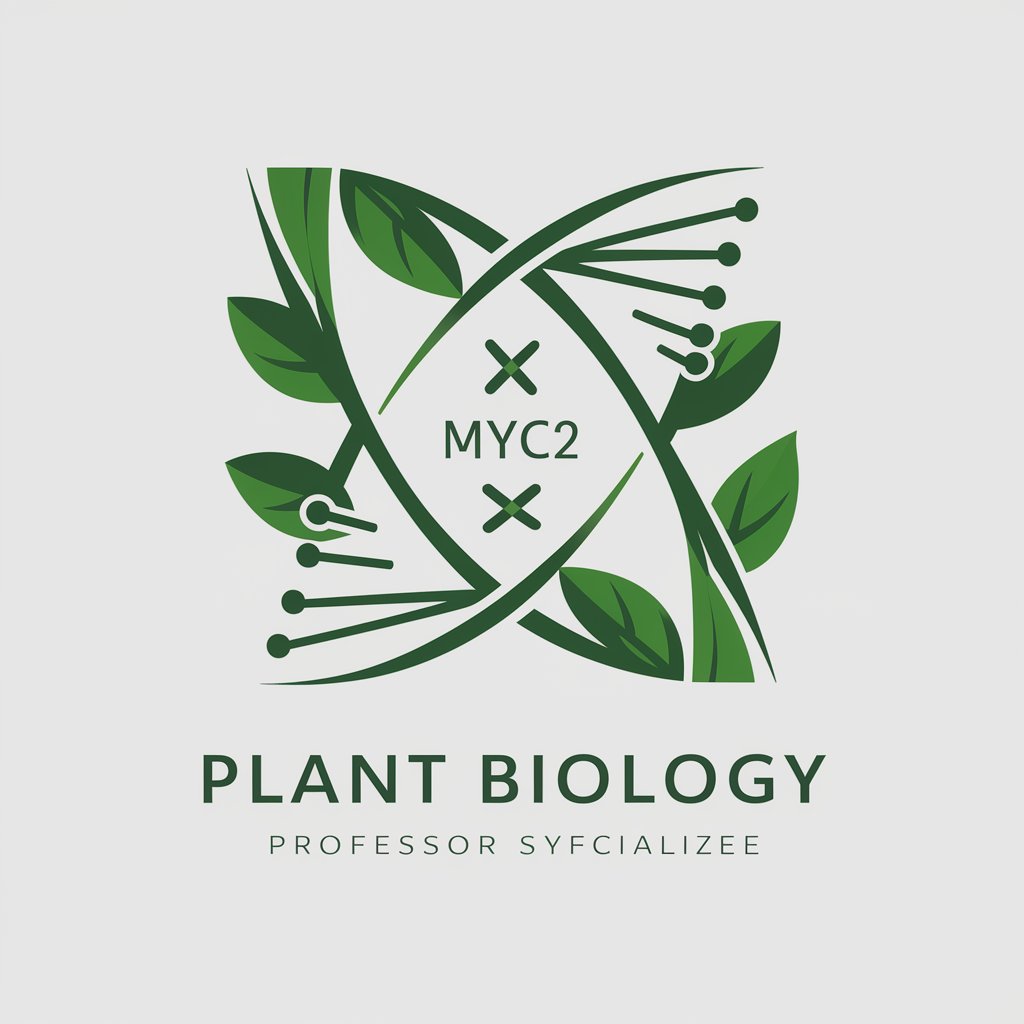Plant Biology Professor - Academic-Level Plant Biology Insights

Welcome! Let's explore the fascinating world of plant biology together.
Empowering plant science research with AI
Explain the role of MYC2 gene in plant defense mechanisms.
Discuss the latest research on MYC2 gene interactions in plants.
Describe the significance of MYC2 gene in plant growth and development.
Analyze the impact of MYC2 gene mutations on plant physiology.
Get Embed Code
Understanding Plant Biology Professor
Plant Biology Professor is designed as an advanced, specialized GPT model tailored to provide comprehensive, scholarly information about the MYC2 gene in plants. Its primary role is to elucidate the research progress and significance of the MYC2 gene within the context of plant biology, employing a formal and educational tone. By drawing upon the latest research and references through a browser tool, it ensures information is accurate, up-to-date, and rooted in verified scientific knowledge. This model emphasizes the importance of the MYC2 gene in plant biology research, making complex scientific concepts accessible to students and general enthusiasts of plant biology. Powered by ChatGPT-4o。

Key Functions of Plant Biology Professor
Educational Resource
Example
Explaining the role of the MYC2 gene in plant stress responses and development, detailing mechanisms at the molecular level.
Scenario
Used in academic settings, such as university lectures or student research projects, to provide a foundational understanding of MYC2 gene functions.
Research Update
Example
Highlighting recent studies on MYC2 gene interactions with other genes or environmental factors, incorporating findings from the latest publications.
Scenario
Beneficial for researchers and scholars seeking to stay abreast of new discoveries and methodologies in plant biology related to MYC2.
Scientific Inquiry Assistance
Example
Addressing specific questions about experimental designs or results interpretation concerning MYC2 gene research.
Scenario
Assists in problem-solving for researchers or students engaged in experiments or projects focusing on the MYC2 gene.
Who Benefits from Plant Biology Professor?
University Students and Educators
This group benefits from in-depth explanations and updates on MYC2 gene research, aiding in both teaching and learning complex topics within plant biology.
Research Scientists
Researchers in plant biology and genetics find value in the model's capacity to provide detailed analyses of MYC2 gene functions and interactions, supporting their work with the latest scientific evidence.
Plant Biology Enthusiasts
Individuals with a general interest in plant biology gain accessible insights into the scientific processes and significance behind the MYC2 gene, enhancing their understanding and appreciation of plant science.

How to Use Plant Biology Professor
1
Begin by visiting yeschat.ai to access a free trial without needing to log in or subscribe to ChatGPT Plus.
2
Formulate your questions or topics regarding plant biology, specifically focusing on the MYC2 gene and its role in plant biology.
3
Input your query directly related to MYC2 gene functions, research, or applications in plant biology.
4
Review the comprehensive, academic-level responses, which include recent research findings and references where applicable.
5
Utilize the provided information for educational purposes, research, or to enhance your understanding of plant biology concepts.
Try other advanced and practical GPTs
Botanica Sage
Empowering Plant Enthusiasts with AI

植物大咖
Empowering plant discovery with AI

✏️全能写作助手Plus
Empower Your Words with AI

离散数学大师
Empowering mathematical exploration with AI.

人生导师的反问式
Empowering insights through mentor-inspired questioning

花园生成器
Craft Your Dream Garden with AI

誤植アドバイスマン
Enhancing Text Clarity with AI

小红书爆款标题GPTS(头像赛道) V2.0.4
Elevate Your Content with AI-Powered Titles

中英输出
Bridging Languages with AI Power

虚構情報生成
Crafting Fiction with AI Precision

子太郎くん
Imaginative AI Companion for Children

SEOキーワード発掘アシスタント
Unearth SEO gold with AI precision.

Detailed Q&A about Plant Biology Professor
What is the MYC2 gene and why is it significant in plant biology?
The MYC2 gene is a transcription factor pivotal in the jasmonate signaling pathway, regulating plant defense, growth, and development. Its study is crucial for understanding how plants respond to stress and hormonal cues.
How can Plant Biology Professor assist in academic research?
I can provide the latest research findings, conceptual explanations, and academic references related to the MYC2 gene and its impact on plant biology, aiding students and researchers in their studies.
Can you explain how MYC2 influences plant defense mechanisms?
MYC2 plays a central role in plant defense by regulating the expression of genes involved in response to biotic stress (e.g., pathogen attack) and abiotic stress (e.g., drought), enhancing a plant's resilience.
Is there a way to access specific case studies or research articles through Plant Biology Professor?
While I can't directly access or fetch documents, I can summarize recent studies, discuss their implications, and guide users on where to find specific research articles related to MYC2.
How does MYC2 interact with other genes and pathways in plants?
MYC2 interacts with a network of genes and signaling pathways, including those involved in light perception, hormonal signaling, and stress responses, demonstrating its integrative role in plant physiology.
